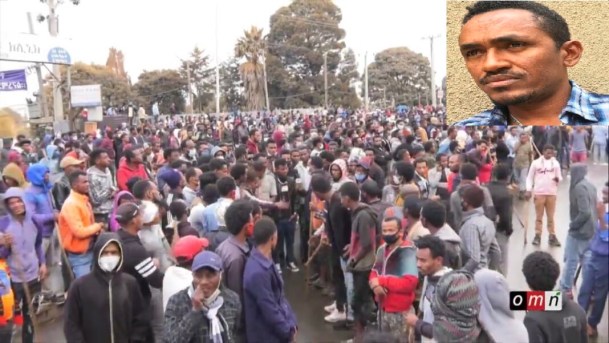By Spy Correspondent
Addis-Ababa: The military was deployed in the Ethiopian capital on Wednesday, as armed gangs roamed neighbourhoods in a second day of unrest that has claimed more than 80 lives and deepened political divisions in Prime Minister Abiy Ahmed’s political heartland.

The protests were sparked by the assassination of popular musician Haacaaluu Hundeessaa on Monday night in what police said was a targeted killing that later spread from Addis Ababa to the surrounding Oromiya region.
Protests reflecting anger at the killing of a popular figure and a sense of political marginalization broke out the next morning in the capital and other towns and cities in the surrounding Oromiya region.

The killing tapped into grievances fuelled by decades of government repression and what the Oromo, Ethiopia’s biggest ethnic group, describe as their historic exclusion from political power.

Gunshots echoed through many neighbourhoods and gangs armed with machetes and sticks roamed the streets. Six witnesses described a situation pitting youths of Oromo origin against some of the city’s other ethnic groups, and where both sides skirmished with police.
“We had a meeting with the community, and we were told to arm ourselves with anything we have, including machetes and sticks. We no longer trust the police to protect us, so we have to prepare ourselves,” said one Addis Ababa resident, who like others interviewed asked not to be named for fear of reprisal.
An Oromo family said an armed gang had tried to break into their compound. Police had responded, but said they couldn’t stay – they were getting too many other calls.

The dispute over Addis triggered three years of bloody street demonstrations that led to the resignation of the previous prime minister and Abiy’s appointment in the post in 2018. Haacaaluu’s music was the soundtrack to a generation of young Oromos who spearheaded the protests.
Another potential flashpoint is the arrests of prominent Oromo opposition leader Bekele Gerba and media mogul Jawar Mohammed on Tuesday.
Jawar was a prominent supporter of Abiy’s appointment, but became more openly critical last year.
Abiy has allowed much greater political freedoms and promised the next polls will be free and fair. But his new ruling party, based on a pan-Ethiopian vision, faces stiff competition from newly emboldened regional powerbrokers like Jawar determined to stake claims for their people after decades of repression.







